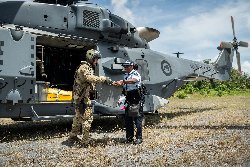FAO’s Asia-Pacific Emergency Centre For Transboundary Animal Diseases: 5 Year Plan For Next Wave Of Zoonotic Diseases
14/05/2021 Bangkok, Thailand – As the SARS-CoV-2 Pandemic continues to claim lives, ruin the health and livelihoods of millions across the Asia-Pacific region, particularly in South Asia at present, a team of veterinary scientists, epidemiologists, sociologists and other One Health experts is beginning a two week session to map out a five year plan on how to predict, prevent and – if necessary – combat the next animal-to-human potential pandemic.
The multi-disciplinary team at FAO’s Emergency Centre for Transboundary Animal Diseases (ECTAD) is convening a series of meetings, beginning today, to plan out the next five years of its programme in Asia and the Pacific. ECTAD is FAO’s corporate centre for planning and delivery of veterinary assistance to its member countries responding to the threat of animal health crises. This is the 15th Annual ECTAD Regional Meeting, and this year – with COVID-19 still spreading – it has attracted some 80 specialists from countries worldwide.
Transboundary animal diseases are still the primary source of most infectious diseases and pandemics afflicting humans. Transboundary animal diseases (TADs) have negative impacts on food safety, the economy, and the environment of countries.
“With about 75 percent of diseases affecting humans having animal origins, addressing Transboundary Animal Disease (TADs) is evidently an imperative, as we have seen with outbreaks such as COVID-19, Ebola and many others,” said Kachen Wongsathapornchai, FAO Senior Animal Health Officer and ECTAD Regional Manager.
Twenty-five years of knowledge in zoonotic diseases
In 2003, something generically referred to as ‘Bird Flu’ made headlines around the world. Avian Influenza H5N1 was a wake-up call to human and veterinary healthcare workers worldwide.
The Food and Agriculture Organization of the United Nations (FAO) responded by opening its first ECTAD regional office in Bangkok. Since then, it has worked with country teams in Bangladesh, Cambodia, China, India, Indonesia, Lao People’s Democratic Republic, Myanmar, Nepal and Viet Nam. The technical work is also backstopped by experts at FAO headquarters in Rome and partnerships globally with the World Organisation for Animal Health (OIE) and the World Health Organization (WHO), among others.
Strengthening animal laboratories prepared Asia for pandemic
FAO is a recognized centre for excellence for its efforts on addressing zoonotic diseases such as Ebola virus disease, MERS-CoV and avian influenza. Resource partners, government counterparts and other partners have been working with FAO on strengthening laboratories across the Asia-Pacific region.
Since the highly pathogenic avian influenza (HPAI) H5N1 outbreaks in 2003, FAO has been working with countries to strengthen their capacities. This proved to be instrumental in the pandemic as animal diagnostic laboratories supported public health efforts in the testing of COVID-19 human samples.
FAO through its ECTAD Programme has also built capacities at all levels for better information sharing and coordination of animal health programmes including addressing antimicrobial resistance (AMR) in the region
A “One Health” approach to addressing TAD
FAO envisages One Health as a collaborative global approach to understanding risks for human and animal health. This includes strengthening monitoring, surveillance, reporting and response tools to addressing risk factors leading to disease spill-overs from wildlife to domestic animals and humans. This holistic approach emphasizes the need to also seriously consider socio-economic and cultural factors to enable better disease prevention and control.
Related links:
- The Emergency Centre for Transboundary Animal Diseases Programme
- Global Health Security Agenda
- A Tripartite Guide to Addressing Zoonotic Diseases in Countries
- Animal Health
- African swine fever
- Antimicrobial Resistance
http://www.fao.org/asiapacific/news/detail-events/en/c/1400197/
Follow us on Twitter @FAOAsiaPacific


 Carbon Market Watch: Going For Green - Is The Paris Olympics Winning The Race Against The Climate Clock?
Carbon Market Watch: Going For Green - Is The Paris Olympics Winning The Race Against The Climate Clock? New Zealand Defence Force: NZDF Working With Pacific Neighbours To Support Solomon Islands Election
New Zealand Defence Force: NZDF Working With Pacific Neighbours To Support Solomon Islands Election UN News: Ceasefire The Only Way To End Killing And Injuring Of Children In Gaza
UN News: Ceasefire The Only Way To End Killing And Injuring Of Children In Gaza ICHRP: US-Japan-Philippines Trilateral Summit Makes The Philippines A Battlefield For US-China Conflict
ICHRP: US-Japan-Philippines Trilateral Summit Makes The Philippines A Battlefield For US-China Conflict East West Center: Environmental Journalist Alexander Kaufman Receives East-West Center’s Inaugural Melvin M.S. Goo Writing Fellowship
East West Center: Environmental Journalist Alexander Kaufman Receives East-West Center’s Inaugural Melvin M.S. Goo Writing Fellowship Compassion in World Farming: Octopus Farm Must Be Stopped, Say Campaigners
Compassion in World Farming: Octopus Farm Must Be Stopped, Say Campaigners